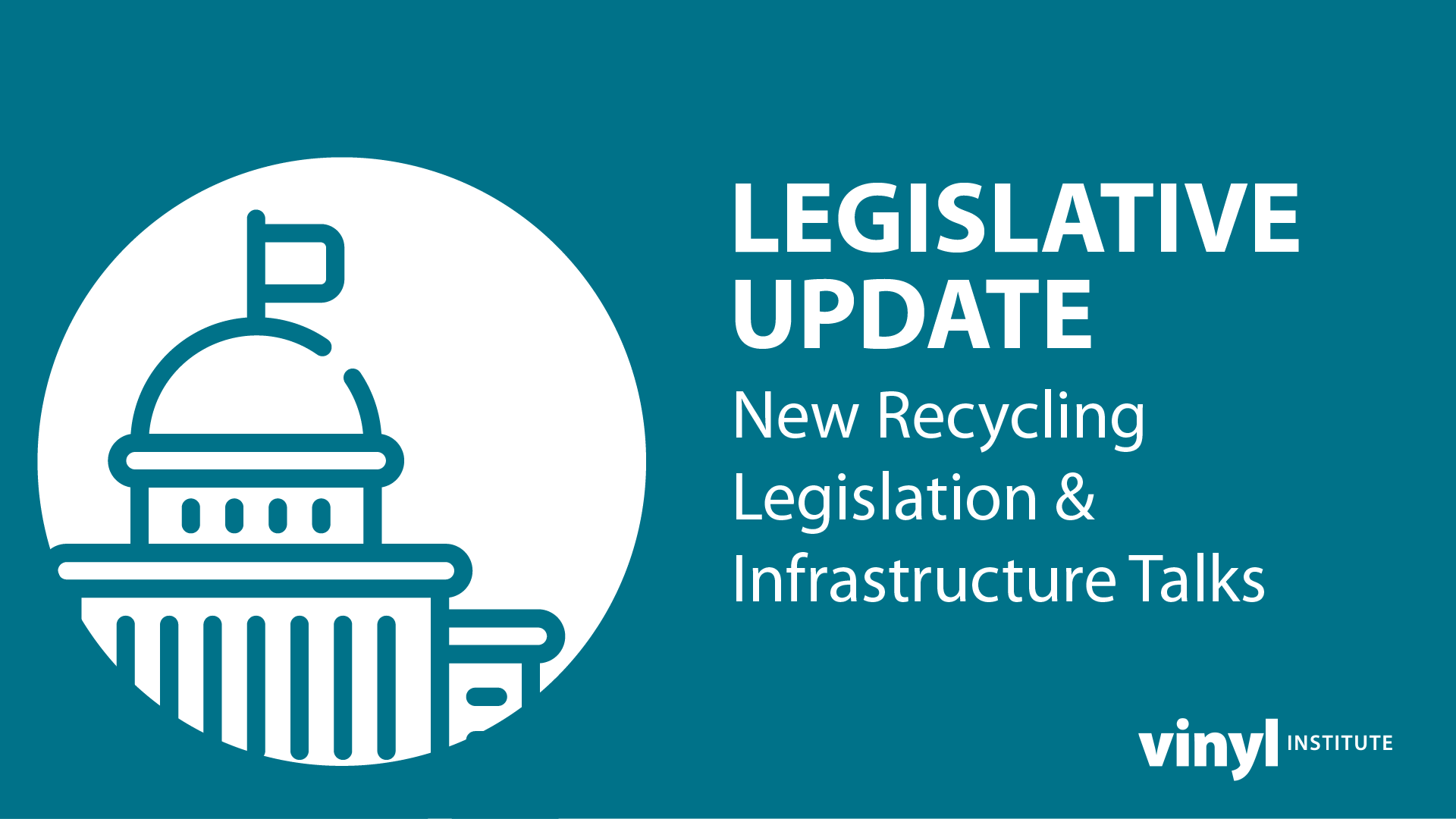This website uses cookies so that we can provide you with the best user experience possible. Cookie information is stored in your browser and performs functions such as recognising you when you return to our website and helping our team to understand which sections of the website you find most interesting and useful.
News
Legislative Update: New Recycling Legislation and Infrastructure Talks
Infrastructure
Congressional committees continue to draft the President’s American Jobs Plan, which would invest over $2 trillion in and expansive view of U.S. infrastructure needs. Key committees plan to complete drafting the bill by May. On April 6, the Senate parliamentarian ruled that the Senate could revise the FY 2021 budget resolution to add new instructions for reconciliation, essentially allowing Democrats to consider moving additional bills, including the infrastructure measures, through the reconciliation process.
Democrats still haven’t revealed the legislative strategy they will use to pass the infrastructure bill. President Biden and Democratic congressional leaders have repeatedly said they would prefer to work with Republicans to pass a bipartisan bill. The White House has invested a significant amount of time over the past few weeks meeting with Republicans who are wary that the outreach is merely a “window dressing” effort to win Republican support. This week, President Biden met with a group of bipartisan lawmakers, and White House Chief of Staff Ron Klain and Counselor to the President Steve Ricchetti met with the bipartisan Problem Solvers Caucus. Democrats will reportedly give Republicans until May to signal their support before they decide to go it alone via another reconciliation package.
Republicans warn that it would be difficult getting the caucus’ support if the administration tries to dismantle the 2017 GOP tax cut. Republicans are also pushing back against the price tag of the President’s infrastructure plan. Furthermore, while upgrading water and wastewater infrastructure has generally looked like one area where there could be bipartisan support and progress, there has been some concern among the Republican ranks that the $111 billion proposed by Biden is too high.
Republicans are planning to provide a more targeted counteroffer to the President’s proposal somewhere in the range of $600 to $800 billion, according to Sen. Shelley Moore Capito (R-WV), the ranking Republican on the Senate Environment and Public Works Committee. The Republican version would reportedly be funded in part by unspecified user fees and unspent COVID dollars. Capito shared that Republicans want to return to the more “regular definition of infrastructure”, such as roads, bridges, ports, airports, water, while including broadband. There have been suggestions that a proposal could be split into several bills that would use different pay-fors for different areas.
Water Infrastructure
Senate Majority Leader Chuck Schumer (D-NY) said Wednesday morning that he is likely to take up consideration of a bipartisan water infrastructure legislation next week. The Drinking Water and Wastewater Infrastructure Act (DWWIA, S. 914) was approved unanimously by the Senate Environment and Public Works Committee on March 24. The $35 billion measure would reauthorize the Drinking Water State Revolving Fund for five years, aims to address lead pipes in the drinking water system, promotes resiliency in infrastructure, and includes a focus on small and disadvantaged communities in federal grants and loan programs. The House bill (H.R. 1915) introduced by Transportation Chairman Peter DeFazio (D-OR) would authorize $50 billion over five years for wastewater alone, including $40 billion through the Clean Water State Revolving Fund and authorizing $10 billion for grants for other wastewater infrastructure.
Biden Administration
President Joe Biden will nominate U.S. Environmental Protection Agency (EPA) Acting Water Chief Radhika Fox and Chemicals Chief Michal Freedhoff to lead their offices permanently. The officials will have to step down from their current positions first and become principal deputies in their respective offices pending Senate confirmation, leaving the top water and toxics division slots open.
On April 14, the Senate confirmed, 53-45, Brenda Mallory to lead the White House Council on Environmental Quality. Mallory was recently the Head of Regulatory Affairs at the Southern Environmental Law Center.
Recycling Legislation
Senator Rob Portman (R-OH) and a bipartisan group of lawmakers introduced the “Recycling Enhancements to Collection and Yield through Consumer Learning and Education Act of 2021” (RECYCLE Act, S. 923) which would create a new federal grant program through EPA to help educate households and consumers about their residential and community recycling programs. A companion bill (H.R. 2159) was also introduced in the House the same day by Rep. Phillip Dean (D-MN).
The lawmakers say consumer confusion is one of the top recycling challenges and through education and outreach, the RECYCLE Act would help increase recycling rates and reduce contamination in the recycling stream. The senators also note that EPA’s 2020 Recycling Economic Information (REI) Report found that recycling supports more than 681,000 jobs and generates $5.5 billion annually in tax revenues. Bill sponsors include Sen. Debbie Stabenow (D-MI) and Reps. David Joyce (R-OH) and Dean Phillips (D-MN). The RECYCLE Act would authorize $15 million over five years in educational grants to states, local governments, Indian tribes, nonprofits, and public private partnerships; directs EPA to develop a model recycling program; and would require EPA to more frequently review and revise, if appropriate, its Comprehensive Procurement Guidelines.
Icon in graphic made by Freepik from www.flaticon.com


